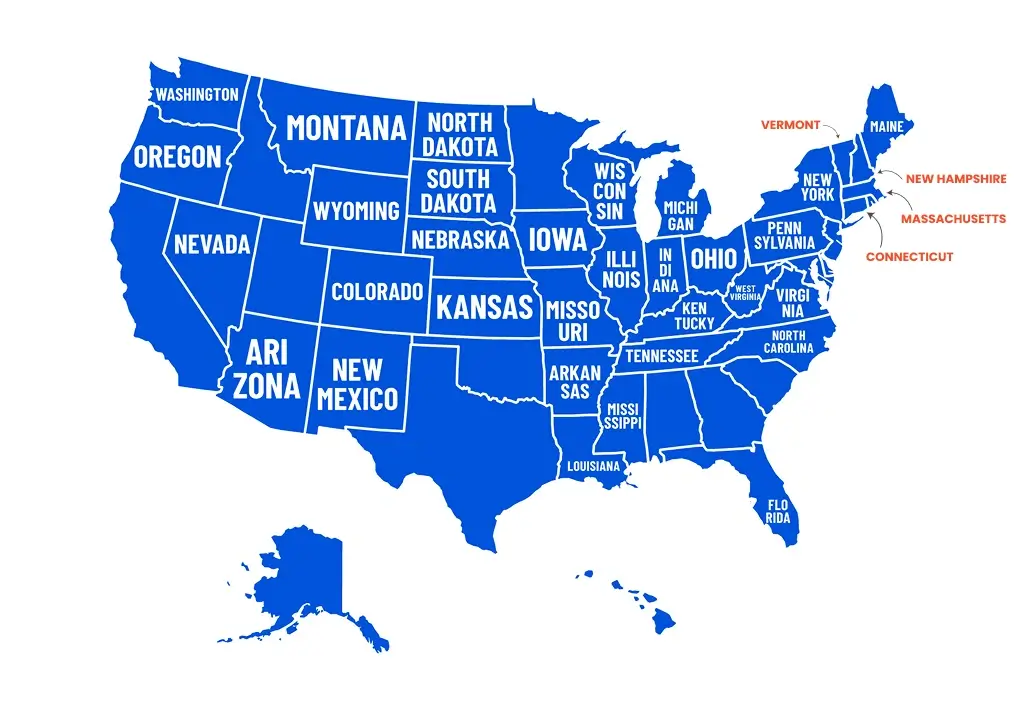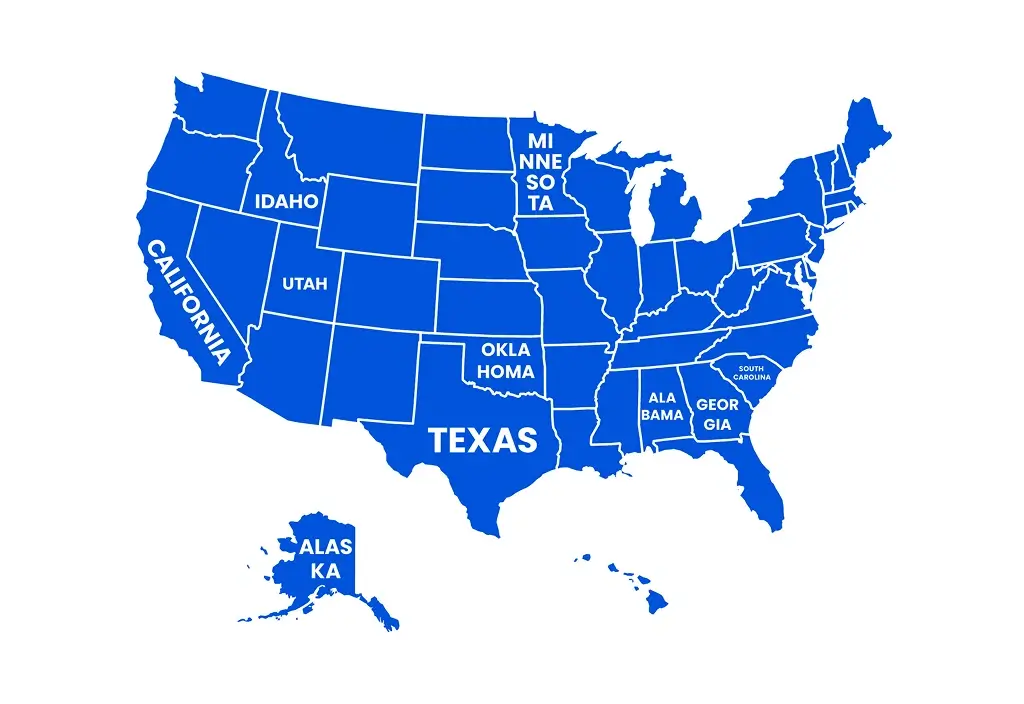
TABLE OF CONTENTS
- Current Sports Betting Laws in the US
- Federal vs. State Sports Betting Laws in the US
- US States Where Sports Betting is Legal
- US States Where Sports Betting is Illegal
- Legal Age of Betting in the US
- Taxes on Sports Betting in the US
- GammaStack: Leading Sports Betting Software Provider for Legalized Sportsbooks
- FAQs on US Betting Laws

Betting in America is not as straightforward as it seems. What’s allowed in one state might be strictly illegal in another. You can legally bet on sport in New Jersey, for instance, but in Utah, you cannot. This is why being familiar with the laws is necessary. Whether you’re betting online or in your local bookie’s, laws can change overnight. Mobile betting is legal in some states, but only at casinos in others. In this guide, we will take you through all you need to know to place a bet to avoid breaking the law.
Let’s get started!
Current Sports Betting Laws in the US
Take a look at the following table to have a better understanding of the US betting laws levied in various US states. This is essential for the bettors to be within the boundaries of sports betting legality.
| State | Legal Betting Age | Online Betting Legal | Mobile Betting Legal | Retail Betting Legal |
|---|---|---|---|---|
| Alabama | N/A | |||
| Alaska | N/A | |||
| Arizona | 21 | |||
| Arkansas | 21 | |||
| California | N/A | |||
| Colorado | 21 | |||
| Connecticut | 21 | |||
| Delaware | 21 | |||
| Florida | 21 | |||
| Georgia | N/A | |||
| Hawaii | N/A | |||
| Idaho | N/A | |||
| Illinois | 21 | |||
| Indiana | 21 | |||
| Iowa | 21 | |||
| Kansas | 21 | |||
| Kentucky | 18 | |||
| Louisiana | 21 | |||
| Maine | 21 | |||
| Maryland | 21 | |||
| Massachusetts | 21 | |||
| Michigan | 21 | |||
| Minnesota | N/A | |||
| Mississippi | 21 | |||
| Missouri | N/A | |||
| Montana | 18 | |||
| Nebraska | 21 | |||
| Nevada | 21 | |||
| New Hampshire | 18 | |||
| New Jersey | 21 | |||
| New Mexico | 21 | |||
| New York | 21 | |||
| North Carolina | 21 | |||
| North Dakota | 21 | |||
| Ohio | 21 | |||
| Oklahoma | N/A | |||
| Oregon | 21 | |||
| Pennsylvania | 21 | |||
| Rhode Island | 18 | |||
| South Carolina | N/A | |||
| South Dakota | 21 | |||
| Tennessee | 18 | |||
| Texas | N/A | |||
| Utah | N/A | |||
| Vermont | 18 | |||
| Virginia | 18 | |||
| Washington | 18 | |||
| Washington, D.C. | 18 | |||
| West Virginia | 21 | |||
| Wisconsin | 21 | |||
| Wyoming | 18 |
According to the American Gambling Association, 40 US states have legalized sports betting while only 11 states have not yet legalized it as of Feb. 27, 2025. Amongst these, Missouri (an US State) has legalized sports betting. However, it is still not in operation. Texas has not made sports betting legal. But, it will soon work on bills that enable legalized sports betting. That said, the total gross gaming revenue (GGR) in 2024 was $115 billion.
Federal vs. State Sports Betting Laws in the US
The US betting laws can be confusing. That's because the federal and state governments both enact laws. The federal laws establish some limitations, yet each state determines what is legal in its territory. Some states permit full online betting. Some do not permit any online betting.
The Wire Act (1961)
The Federal Wire Act prohibits using “wire communication facility” for interstate sports wagering. Originally, it focused on organized phone betting. But courts have applied it to online platforms. The DOJ handles the enforcement. Violations in the act can cause heavy fines and up to two years in prison.
PASPA and Its Repeal (2018)
PASPA was a law that made it illegal to bet on single sports games in most US states. The Supreme Court decided that PASPA was not fair and let each state make its own rules about betting. After that, New Jersey was one of the first states to allow betting and quickly became a popular place for people to bet on sports.
Remaining Federal Oversight
The Unlawful Internet Gambling Enforcement Act (UIGEA) of 2006 stops payment processors from helping with illegal online betting. UIGEA also asked banks to check where the money is going and stop any payments for illegal betting. Also, there are Anti-Money Laundering (AML) rules to stop money laundering. This means that sports betting operators need to know who their customers are via KYC. Operators were also asked to report any suspicious activity.
US States Where Sports Betting is Legal

- Washington
- Oregon
- Nevada
- Arizona
- New Mexico
- Colorado
- Wyoming
- Montana
- North Dakota
- South Dakota
- Nebraska
- Kansas
- Iowa
- Missouri
- Arkansas
- Louisiana
- Mississippi
- Tennessee
- Kentucky
- Indiana
- Illinois
- Wisconsin
- Michigan
- Ohio
- Florida
- North Carolina
- Virginia
- West Virginia
- Maine
- Maryland
- New Jersey
- Pennsylvania
- Delaware
- Connecticut
- New York
- Massachusetts
- Rhode Island
- Vermont
- New Hampshire
- District of Columbia
Retail betting is legalized in 37 states and illegal in 14 states including Vermont, Tennessee and Maine. Online sports betting is legal in 34 states and illegal in 17 states in the US.
States like Utah and Hawaii continue to ban all forms of sports wagering.
US States Where Sports Betting is Illegal


Alabama
Alabama is still one of the few states where sports betting is not legal. This is mostly because of political pushback and low public support. A plan to allow sports betting and other games was introduced in 2024 but did not pass. The state also has no lottery, making gambling laws very strict. Lawmakers are likely to try again in 2025.

Alaska
Alaska has not taken big steps yet to allow sports betting. The state has a small population and few gambling options. Thus, it's not a main focus for lawmakers. Right now, there are no active bills to legalize it.

California
California has tried to legalize sports betting, but it's been tough. Tribal casinos have a big say in the state’s gambling rules, and their interests often clash. Many plans, including ones for retail and online betting, have failed. Lawmakers may try again in 2025, but there are still big challenges ahead.

Georgia
Georgia has tried many times to legalize sports betting. Pro sports teams and some lawmakers support it. But political disagreements have stopped the efforts each time. The latest try in 2024 failed. Now, any chance of legal sports betting is delayed until at least 2025.

Hawaii
Hawaii has always said no to all types of gambling, including sports betting. The state’s location and strong cultural values play a big role in this. Right now, there are no plans or bills to make sports betting legal.

Idaho
Idaho has not shown much interest in legal sports betting. The state holds strong conservative views and does not support expanding gambling. In recent years, lawmakers have not seriously talked about passing any sports betting laws or coming under sports betting legality.

Minnesota
Minnesota has tried many times to legalize sports betting. Unfortunately, none have worked. In 2024, a new bill was introduced. It did not pass because of worries about in-game betting and gambling problems. Supporters are expected to push for it again in 2025.

Oklahoma
Oklahoma’s future in sports betting depends on its tribal gaming. Negotiations between the state and tribes have made some progress. But no final law has been passed yet. Legal sports betting will likely happen only if these negotiations move forward.

South Carolina
South Carolina has made very little progress in legalizing sports betting. The state’s strict views on gambling have slowed things down. No major law changes are expected anytime soon.

Texas
Texas has not moved quickly on sports betting, even with its big population and strong market potential. Many conservative leaders still oppose it, which has slowed things down. There was a small push in 2023, but new betting laws likely won’t happen before 2025 end.

Utah
Utah has the strictest gambling laws in the U.S. No type of gambling is allowed in the state. Sports betting is not being discussed, and chances of change are very low. Strong religious and cultural beliefs make it unlikely that Utah will allow betting anytime soon.
EXPLORE MORE BLOGS FROM VARIOUS CATEGORIES
Legal Age of Betting in the US
Betting in the US is getting more exposure with more states engaging in legalized sports betting. However, gambling can be addictive and only the adults can engage in them. Thus, the US government has strictly enforced age restrictions. Some US state bettors need to be at least 21+ years of age to be able to bet. Some of the other US states mention that bettors need to be at least 18 years to take part in betting.
Let’s get some details here.
US States Where You Can Bet on Sports at 18
- Rhode Island
- Washington, D.C.
- Kentucky
- Montana
- New Hampshire
- Wyoming
US States Where You Must be 21 to Bet on Sports
- Indiana
- Colorado
- Ohio
- Nevada
- West Virginia
- North Carolina
- New York
- Michigan
- Mississippi
- Arkansas
- South Dakota
- Louisiana
- Maryland
- Wisconsin
- Delaware
- Connecticut
- Pennsylvania
- Maine
- Arizona
- Virginia
- Illinois
- Oregon
- New Jersey
- Iowa
Taxes on Sports Betting in the US
Sports betting is legal in many parts of the U.S., but winnings aren’t all yours to keep. Just like regular income, gambling winnings are taxed. Whether you win online or at a casino, you may need to report it. This guide explains how sports betting taxes work. We’ll break down the taxes on sports betting in the U.S simply so you know what to expect and how to stay legal.
The Internal Revenue Service (IRS) taxes all gambling winnings including sports betting.
If you win $600 or more and it’s at least 300 times your bet, the casino or platform should give you a W-2G tax form. This may be handed to you or mailed later. You must receive it by January 31 of the next year.
If you win $5,000 or more, they might take out 24% for federal taxes before you even get your money.
Even if you win less than $600, you still have to report it on your taxes. It’s smart to track all wins and losses. Save receipts and notes.
Each bet must be listed on its own. You can’t subtract losses to report a smaller amount. For example, if you lose $600 on one bet and later win $1,000, you still have to report the full $1,000.
Whether you win $1 or $1 million, it all counts. Bigger wins get more attention from the IRS, so be careful and honest.
To submit your sports betting winnings according to US betting laws, you have to -
- Report your wins on tax return as gambling income in point 8 of IRS form “Schedule 1 form 1040”.
- Report your losses as itemized deductions on Schedule A of IRS form 1040 in case of any losses.
Want To Launch A Legal Sportsbook In The US?
GammaStack: Leading Sports Betting Software Provider for Legalized Sportsbooks
GammaStack stands out as a top choice for legalized sportsbooks. With over 13 years in the industry, we offer sportsbook software that is fully customizable. Our platform supports 100+ betting markets, ensuring a wide range of options for bettors. Features like live betting, real-time odds, and multi-device compatibility enhance user engagement. We also provide 24/7 end-to-end support for both development and license acquisition. Our commitment to security, scalability, and innovation makes us a reliable partner for launching a successful sportsbook.
FAQs on US Betting Laws
The US has legalized sports betting in 40 states as of February 2025. Some of them include - Delaware, New York, New Jersey, Washington, Nevada, Ohio etc.
Yes, online sports betting is now permitted in most of the United States. As of April 2025, 32 states and the District of Columbia permit online sports betting. Besides, it isn't everywhere legal. The US states like California, Texas, Georgia, and Utah still don't allow online sports betting. If you live in a state in which the activity is legal, you can bet online via authorized apps or sites. Bettors must check the laws in their state before betting.
Regulated sports betting in the U.S. faces challenges such as -
- State-specific rules
- Protecting people from gambling harm
- Legal disputes over betting eligibility
- Confusion about online betting laws
- Scandals and cheating concerns
Gambling activities are strictly prohibited in all government-owned or leased facilities unless specifically authorized by statute or regulation. Additionally, federal employees are prohibited from engaging in gambling activities while on duty. Disciplinary action may be taken against those who violate these regulations.
Ensure you are aware of the sports betting tax regulations in your state. Also, remember that federal law mandates a 24% tax on gambling winnings exceeding $600 in a single wager, provided the total winnings are more than 300 times the bet amount.







